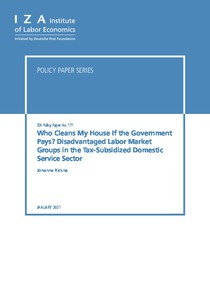Who cleans my house if the government pays? Disadvantaged labor market groups in the tax-subsidized domestic service sector

Institute of Labor Economics, Bonn
IZA - Bonn
2021
34 p.
domestic work ; employment subsidy ; migrant worker ; immigration ; fiscal policy
Policy Paper
171
Service sector
English
Bibliogr.
"Many European countries have implemented policies to revive their domestic service sectors. A common goal of these reforms has been to create employment for disadvantaged groups on the labor market. I study Sweden, where a 50% tax deduction on labor costs for domestic services was introduced in 2007. I use detailed administrative data to report the shares of three disadvantaged groups among small business owners and employees in tax-subsidized firms. I then compare these shares to all private firms and to firms in two industrial subsectors with a predominance of elementary occupations. I find that the shares of refugees and long-term unemployed are of similar sizes in the subsidized firms as in the private sector as a whole. For the third group—people with a low level of education—I find a larger share in the subsidized firms compared to the average private firm, but a smaller share compared to the other industries with elementary occupations. An extended analysis suggests that labor immigration to the subsidized sector from other EU countries may have crowded out the disadvantaged groups. EU immigrants operate half of all subsidized firms in Sweden's largest cities and employ mainly other EU immigrants in their businesses."
Digital
The ETUI is co-funded by the European Union. Views and opinions expressed are however those of the author(s) only and do not necessarily reflect those of the European Union or the ETUI.